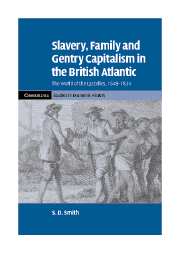 Slavery, Family, and Gentry Capitalism in the British Atlantic
Slavery, Family, and Gentry Capitalism in the British Atlantic Published online by Cambridge University Press: 17 July 2009
& of what avail is it, if a Man is possessed of 20 Plantations, if when he dies, they are all to be sold to pay his Debts?
(Daniel Lascelles to Thomas Harvie, 25 May 1767)By the end of the eighteenth century, the Earls of Harewood controlled one of the greatest of all West Indian interests (Table 7.1). But the Lascelles were reluctant planters: the family had never aspired to become large-scale, absentee owners of sugar estates. Indeed, between the laying of Harewood House's foundation stone in 1759 to the time Robert Adam's and John Carr's masterpiece was ready for occupation in 1771, neither Edwin Lascelles nor his brother Daniel possessed a single slave or acre in the West Indies.
The family's lack of ownership of West Indian estates during the 1760s and early 1770s is extraordinary given the acquisition of plantations on Barbados by Edward Lascelles in 1648 and William Lascelles in 1684. Barbadian merchants never divorced themselves from land completely despite a general retreat from plantation ownership during the later seventeenth century. Characteristically, the island's wealthiest traders combined commercial careers with ownership of at least a single property. Possession of a sugar estate complemented the activities of slave trading and sugar exporting, while landownership raised the prospect of nomination to the Barbados Council, election to the Assembly, or judicial appointment to one of the island's courts.
To save this book to your Kindle, first ensure [email protected] is added to your Approved Personal Document E-mail List under your Personal Document Settings on the Manage Your Content and Devices page of your Amazon account. Then enter the ‘name’ part of your Kindle email address below. Find out more about saving to your Kindle.
Note you can select to save to either the @free.kindle.com or @kindle.com variations. ‘@free.kindle.com’ emails are free but can only be saved to your device when it is connected to wi-fi. ‘@kindle.com’ emails can be delivered even when you are not connected to wi-fi, but note that service fees apply.
Find out more about the Kindle Personal Document Service.
To save content items to your account, please confirm that you agree to abide by our usage policies. If this is the first time you use this feature, you will be asked to authorise Cambridge Core to connect with your account. Find out more about saving content to Dropbox.
To save content items to your account, please confirm that you agree to abide by our usage policies. If this is the first time you use this feature, you will be asked to authorise Cambridge Core to connect with your account. Find out more about saving content to Google Drive.